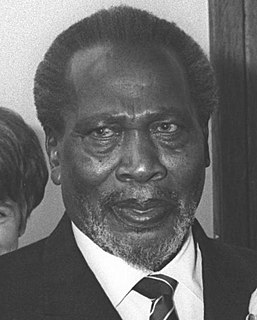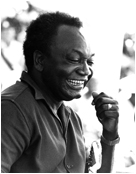Political party in Kenya
 |
|---|
|
Economic schemes |
The African People's Party (APP) was a political party in Kenya.
 |
|---|
The African People's Party (APP) was a political party in Kenya.
The APP was established in September 1962 by Paul Ngei after he had left the Kenya African National Union (KANU) following a disagreement with Jomo Kenyatta and Tom Mboya. [1] With much of its support from the Kamba, the party formed an electoral pact with the Kenya African Democratic Union (KADU) for the May 1963 general elections. [1]
The elections saw the APP win eight seats in the House of Representatives and two in the Senate, all won in Kitui and Machakos. [1] The party later abandoned its pact with KADU due to its support for a federal constitution, and was disbanded in September 1963 when its MPs joined KANU. [1]

A part of Eastern Africa, the territory of what is known as Kenya has seen human habitation since the beginning of the Lower Paleolithic. The Bantu expansion from a West African centre of dispersal reached the area by the 1st millennium AD. With the borders of the modern state at the crossroads of the Bantu, Nilo-Saharan and Afro-Asiatic ethno-linguistic areas of Africa, Kenya is a truly multi-ethnic state.

Daniel Toroitich arap Moi was a Kenyan politician, statesman, and kleptocrat who was the second and longest-serving President of Kenya from 1978 to 2002. He previously served as the third Vice President of Kenya from 1967 to 1978, and succeeded President Jomo Kenyatta following the latter's death.

The Kenya African National Union (KANU) is a Kenyan political party that ruled for nearly 40 years after Kenya's independence from British colonial rule in 1963 until its electoral loss in 2002. It was known as Kenya African Union (KAU) from 1944 to 1952. The KAU was banned by the colonial government from 1952 to 1960. It was re-established by James Gichuru in 1960 and renamed KANU on 14 May 1960 after a merger with Tom Mboya's Kenya Independence Movement.

Jomo Kenyatta was a Kenyan anti-colonial activist and politician who governed Kenya as its Prime Minister from 1963 to 1964 and then as its first President from 1964 to his death in 1978. He was the country's first indigenous head of government and played a significant role in the transformation of Kenya from a colony of the British Empire into an independent republic. Ideologically an African nationalist and conservative, he led the Kenya African National Union (KANU) party from 1961 until his death.

The Kenya African Democratic Union (KADU) was a political party in Kenya. It was founded in 1960 when several leading politicians refused to join Jomo Kenyatta's Kenya African National Union (KANU). It was led by Ronald Ngala who was joined by Moi's Kalenjin Political Alliance, the Masai United Front, the Kenya African Peoples Party, the Coast African Political Union, Masinde Muliro's Baluhya Political Union and the Somali National Front. The separate tribal organisations were to retain their identity and so, from the very start, KADU based its political approach on tribalism. KADU's aim was to defend the interests of the so-called KAMATUSA as well as the British settlers, against the imagined future dominance of the larger Luo and Kikuyu that comprised the majority of KANU's membership, when it became inevitable that Kenya will achieve its independence. The KADU objective was to work towards a multiracial self government within the existing colonial political system. After release of Jomo Kenyatta, KADU was becoming increasingly popular with European settlers and, on the whole, repudiated Kenyatta's leadership. KADU's plan at Lancaster meetings was devised by European supporters, essentially to protect prevailing British settlers land rights.

Elections in Kenya take place within the framework of a multi-party democracy and a presidential system. The President, Senate and National Assembly are directly elected by voters, with elections organised by the Independent Electoral and Boundaries Commission (IEBC).
Masinde Muliro was a Kenyan politician, one of the central figures in the shaping of the political landscape in Kenya. A renowned anti-colonial activist, he campaigned for the restoration of multi-party democracy in Kenya in his later years. He was a ruthless negotiator and a proponent of peaceful but focused politics. He had a reputation for integrity rivaled only by Ronald Ngala. Considered by some as one of the best leaders that never became president, it has been speculated that had he not died, he may have beaten Daniel arap Moi for the presidency in 1992.

George Musengi Saitoti, E.G.H. was a Kenyan politician, businessman and American- and British-trained economist, mathematician and development policy thinker.

General elections were held in Kenya on 27 December 2002. Voters elected the President, and members of the National Assembly. They coincided with the 2002 Kenyan local elections.

The Party of National Unity (PNU) is a political party in Kenya originally founded as a political coalition. On 16 September 2007, Kenyan President Mwai Kibaki announced the party formation and said that he would run as its presidential candidate in the December 2007 Kenyan elections. It has since become a political party in its own right following conditions set by the Political Parties Act, passed in Kenya in 2008. Recently PNU has launched activities to revamp itself ahead of the 2022 general elections.
This article contains detailed results of the parliamentary election that was held as part of the Kenyan general election in December 2007.

General elections were held in Kenya on 27 December 2007. Voters elected the President, and members of the National Assembly. They coincided with the 2007 Kenyan local elections.

Majimbo is a Swahili term that is commonly used in Kenya to refer to the idea of political devolution of power to the country's regions. It is alleged by critics, including former vice-president Oginga Odinga in his book Not Yet Uhuru, to have been coined by European settlers in Kenya's White Highlands region, around the time of independence in 1963, who preferred to retain an autonomous, ethnically-based governance over the region. It has also been alleged, by some of its critics, that majimbo is a pretext for the type of communal violence that has plagued Kenya's elections especially since the return of multiparty politics. In his autobiography Illusions of Power, G.G Kariuki, a long serving KANU Member of Parliament, goes as far as to allege the existence of a plot to instigate communal violence in Kenya's independence elections by supporters of a Majimbo system of government.

Kenya's 1963 Constitution, also called the Independence Constitution, was based on the standard "Lancaster House template" used for the former British colonies in Africa, was subject to early amendments, and was replaced in 1969.
General elections were held in Kenya Colony between 18 and 26 May 1963. Voters elected members of the House of Representatives and Senate. The election was the last before independence later in the year.

General elections were held in Kenya on 6 December 1969, the first since independence in 1963. The country had become a de facto one-party state after President Jomo Kenyatta had banned the Kenya People's Union on 30 October, with Kenyatta's Kenya African National Union being the sole party to participate in the election. Although the post of President of Kenya was due to be elected at the same time as the National Assembly, Kenyatta was the sole candidate and was automatically elected without a vote being held.

Ronald Gideon Ngala (1923–1972) was a Kenyan politician who was the leader of the Kenya African Democratic Union political party from its creation in 1960 until its dissolution in 1964.
Joseph Martin Shikuku Oyondi was a Kenyan politician.

The Kenya African Democratic Union – Asili (KADU–Asili) is a political party in Kenya.

The presidency of Jomo Kenyatta began in 12 December 1964, when Jomo Kenyatta was named as the 1st president of Kenya, and ended on 22 August 1978 upon his death. Jomo Kenyatta, a KANU member, took office following the formation of the republic of Kenya after independence following his efforts during the fight for Independence. Four years later, in the 1969 elections, he was the sole candidate and was elected unopposed for a second term in office. In 1974, he was re-elected for a third term. Although the post of President of Kenya was due to be elected at the same time as the National Assembly, Jomo Kenyatta was the sole candidate and was automatically elected without a vote being held. He died in 22 August 1978 while still in office and was succeeded by Daniel arap Moi.